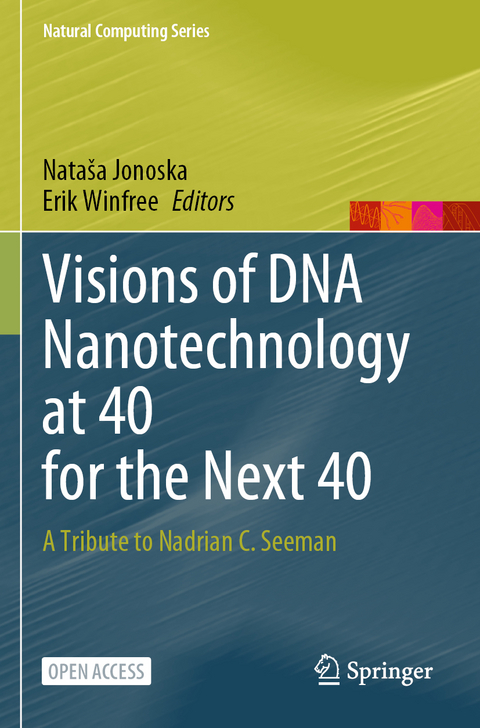
Visions of DNA Nanotechnology at 40 for the Next 40
Springer Verlag, Singapore
9789811998935 (ISBN)
From this vantage point, what are the untold stories, the unspoken concerns, the underlying fundamental issues, the overlooked opportunities, and the unifying grand challenges? What will help us see more clearly, see more creatively, or see farther? What is transpiring right now that could pave the way for the future? To addressthese questions, leading researchers have contributed 22 chapters, grouped into five sections: perspectives, chemistry and physics, structures, biochemical circuits, and spatial systems.
This book will be an important reference point in the field of DNA nanotechnology, both for established researchers looking to take stock of the field and its future, and for newcomers such as graduate students and researchers in other fields who are beginning to appreciate the power and applicability of its methods.
Nataša Jonoska is a mathematician and a Distinguished Professor at the University of South Florida known for her work in DNA computing. In 2007, she won the Rozenberg Tulip Award in DNA Computing for her work in applications of Automata theory and graph theory to DNA nanotechnology and was elected an AAAS Fellow in 2014 for advancements in understanding information processing in molecular self-assembly. She earned her PhD in mathematics from the State University of New York at Binghamton in 1993 when she joined USF. Erik Winfree is a Professor of Computer Science, Computation and Neural Systems, and Bioengineering at Caltech. Elected a Fellow of the AAAS (2015), he is the recipient of the Feynman Prize for Nanotechnology (2006), a MacArthur Fellowship (2000), and the first Rozenberg Tulip Award in DNA Computing (2000). Prior to starting his research group at Caltech in 2000, he did postdoctoral work at Princeton and was a visiting researcher at MIT. Professor Winfree earned his bachelor's degree in mathematics from the University of Chicago in 1991, and studied computation and neural systems at Caltech, earning his PhD in 1998.
Beyond Watson-Crick.- DNA nanotechnology out of equilibrium.- The Evolution of DNA-Based Molecular Computing.- DNA Nanotechnology Research in Japan.- Reminiscences from the Trenches.- Beyond DNA.- Controlling single molecule conjugated oligomers and polymers with DNA.- Organizing charge flow with DNA.- DNA Assembly of Dye Aggregates.- Building with DNA.- From Molecules to Mathematics.- Origami Life.- Ok: a kinetic model for locally reconfigurable molecular systems.- Implementing a Theoretician’s Toolkit for Self-Assembly with DNA Components.- Reasoning As If.- Scaling up DNA computing with array-based synthesis and high-throughput sequencing.- Sequenceable Event Recorders.- Computational Design of Nucleic Acid Circuits.- Parallel computations with DNA-encoded chemical reaction networks.- Social DNA Nanorobots.- Models of Gellular Automata.- Patterning DNA origami on membranes through protein self-organization.
| Erscheinungsdatum | 07.07.2023 |
|---|---|
| Reihe/Serie | Natural Computing Series |
| Zusatzinfo | 145 Illustrations, color; 15 Illustrations, black and white |
| Verlagsort | Singapore |
| Sprache | englisch |
| Maße | 155 x 235 mm |
| Themenwelt | Mathematik / Informatik ► Informatik ► Theorie / Studium |
| Naturwissenschaften ► Biologie ► Biochemie | |
| Naturwissenschaften ► Biologie ► Genetik / Molekularbiologie | |
| Technik | |
| Schlagworte | bio-inspired computing • Computer-Aided Design • DNA computing • DNA nanotechnology • Information-based chemistry • Molecular Programming • Natural Computing • open access • Self-assembly and self-organization • Structure and function |
| ISBN-13 | 9789811998935 / 9789811998935 |
| Zustand | Neuware |
| Informationen gemäß Produktsicherheitsverordnung (GPSR) | |
| Haben Sie eine Frage zum Produkt? |
aus dem Bereich


